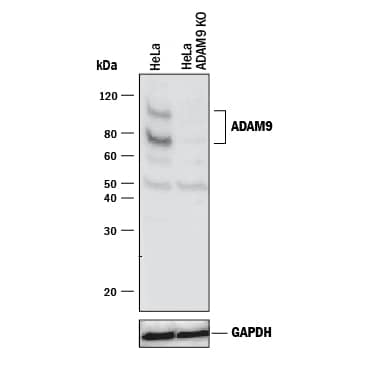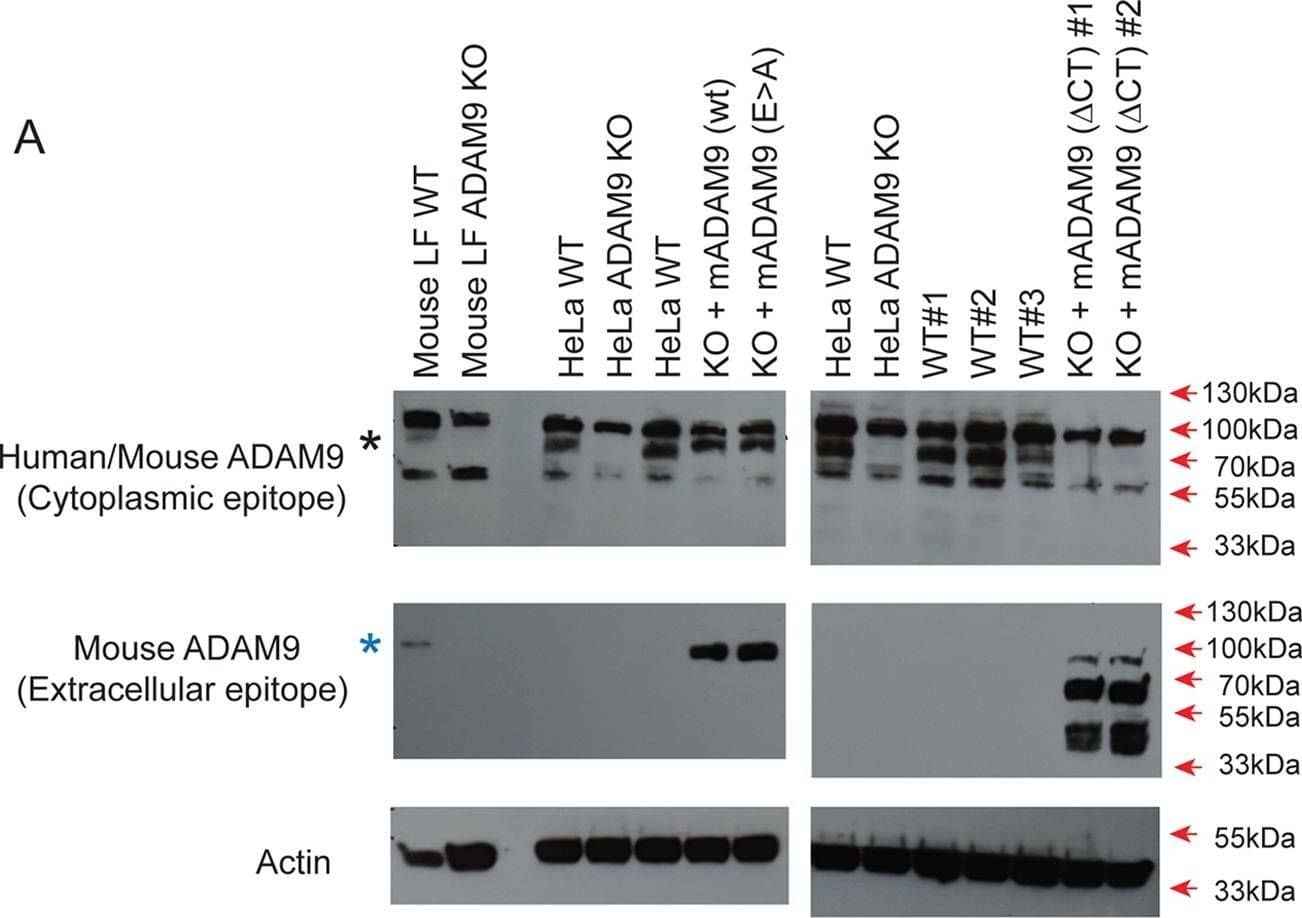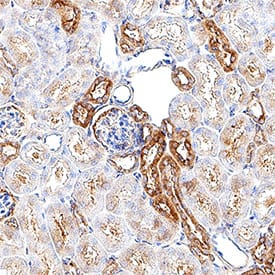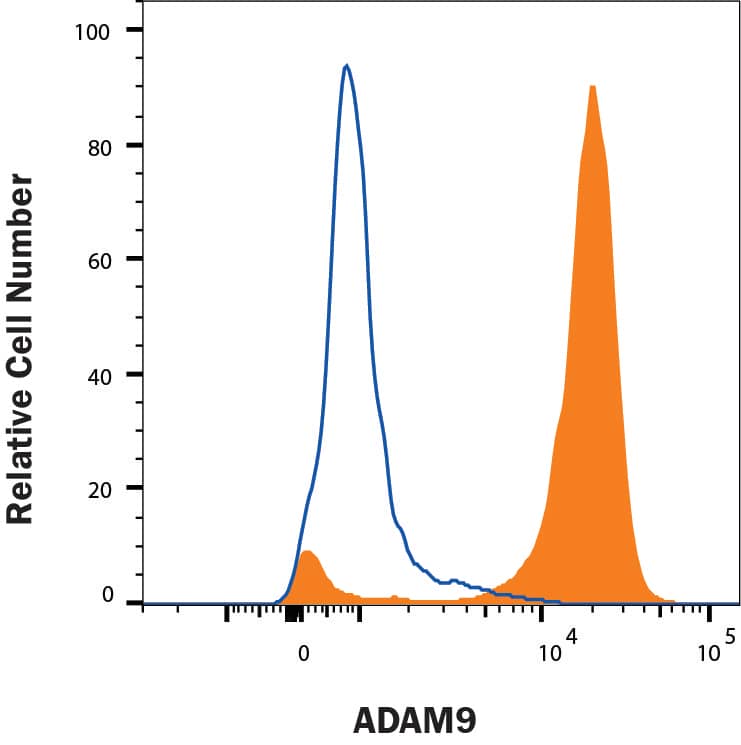Human/Mouse ADAM9 Ectodomain Antibody
R&D Systems, part of Bio-Techne | Catalog # AF949

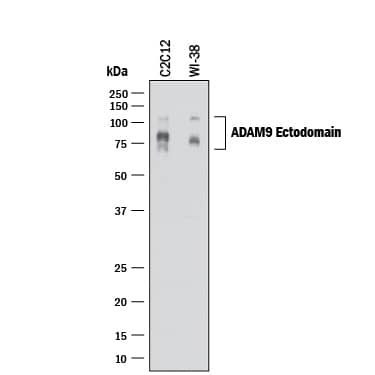
Key Product Details
Validated by
Species Reactivity
Validated:
Cited:
Applications
Validated:
Cited:
Label
Antibody Source
Product Specifications
Immunogen
Ala206-Asp697
Accession # Q61072
Specificity
Clonality
Host
Isotype
Scientific Data Images for Human/Mouse ADAM9 Ectodomain Antibody
Detection of Human and Mouse ADAM9 by Western Blot.
Western blot shows lysates of C2C12 mouse myoblast cell line and WI-38 human lung fibroblast cell line. PVDF membrane was probed with 1 µg/mL of Goat Anti-Human/Mouse ADAM9 Ectodomain Antigen Affinity-purified Polyclonal Antibody (Catalog # AF949) followed by HRP-conjugated Anti-Goat IgG Secondary Antibody (HAF017). Specific bands were detected for ADAM9 at approximately 110 and 80 kDa (as indicated). This experiment was conducted under reducing conditions and using Immunoblot Buffer Group 1.Western Blot Shows Human ADAM9 Specificity by Using Knockout Cell Line.
Western blot shows lysates of HeLa human cervical epithelial carcinoma parental cell line and ADAM9 knockout HeLa cell line (KO). PVDF membrane was probed with 1 µg/mL of Goat Anti-Human/Mouse ADAM9 Ectodomain Antigen Affinity-purified Polyclonal Antibody (Catalog # AF949) followed by HRP-conjugated Anti-Goat IgG Secondary Antibody (HAF017). Specific bands were detected for ADAM9 at approximately 78 and 110 kDa (as indicated) in the parental HeLa cell line, but is not detectable in knockout HeLa cell line. GAPDH (AF5718) is shown as a loading control. This experiment was conducted under reducing conditions and using Immunoblot Buffer Group 1.Detection of Mouse ADAM9 by Western Blot
Rescue of ADAM9 expression restores EMCV replication in ADAM9 KO cells. WT and ADAM9 KO HeLa cells were transduced with retroviral vectors with wild-type (WT) murine ADAM9 (mADAM9), catalytically inactive mutant ADAM9 (E>A), cytoplasmic-tail-deleted ( deltaCT) ADAM9 constructs, or GFP control vectors. (A) WT, KO, and rescue cell lysates were analyzed by Western blot using two different ADAM9 antibodies. Top panel, rabbit anti-human ADAM9 that detects an epitope in the intracellular domain of human ADAM9 and cross-reacts with mouse ADAM9 (black asterisk). Middle panel, goat anti-mouse ADAM9 that detects the extracellular domain of murine ADAM9 but not human ADAM9 (blue asterisk). Bottom panel, anti-actin which detects both human and murine beta-actin. Top panel, WT but not KO cells expressed human ADAM9. Middle panel, rescue but not KO cells expressed murine ADAM9. Bottom panel, actin loading control. (B) WT clones, ADAM9 KO clones, and rescued ADAM9-expressing clones were infected with EMCV or CVB3 at various MOIs and incubated at 37°C for 24 h. Viability of EMCV-infected and CVB3-infected clones was measured by CellGlo ATP luminescence. (C) EMCV replication was quantified in infected culture supernatants by plaque assay. Neither the functional sequence of the ADAM9 metalloproteinase domain nor the cytoplasmic tail is required for EMCV infection. ***, P < 0.0001, KO versus WT and KO versus rescue. Image collected and cropped by CiteAb from the following open publication (https://pubmed.ncbi.nlm.nih.gov/30723129), licensed under a CC-BY license. Not internally tested by R&D Systems.Applications for Human/Mouse ADAM9 Ectodomain Antibody
CyTOF-ready
Flow Cytometry
Sample: Mouse splenocytes, C2C12 mouse myoblast cell line
Immunohistochemistry
Sample: Immersion fixed paraffin-embedded sections of mouse kidney
Immunoprecipitation
Sample: Conditioned cell culture medium spiked with Recombinant Mouse ADAM9 (Catalog # 949-AD), see our available Western blot detection antibodies
Knockout Validated
Western Blot
Sample: C2C12 mouse myoblast cell line and WI‑38 human lung fibroblast cell line
Formulation, Preparation, and Storage
Purification
Reconstitution
Formulation
*Small pack size (-SP) is supplied either lyophilized or as a 0.2 µm filtered solution in PBS.
Shipping
Stability & Storage
- 12 months from date of receipt, -20 to -70 °C as supplied.
- 1 month, 2 to 8 °C under sterile conditions after reconstitution.
- 6 months, -20 to -70 °C under sterile conditions after reconstitution.
Background: ADAM9
ADAM9, also known as MDC9 or meltrin gamma, is a member of the ADAM family that contains a disintegrin and metalloprotease-like domain (1). Like other membrane‑anchored ADAMs, ADAM9 consists of a pro domain with a cysteine switch and furin cleavage sequence, a catalytic domain with the zinc-binding site and Met-turn expected for reprolysins, a disintegrin-like domain, a cysteine-rich domain, an EGF-like domain, a transmembrane domain, and the cytoplasmic domain. ADAM9 is able to cleave peptides corresponding to cleavage sites of tumor necrosis factor-alpha (TNF-alpha), the p75-TNF receptor, the beta-amyloid protein precursor, and the c-kit ligand-1, implying that it may participate in shedding of these membrane proteins (2). In fact, ADAM9 has been shown to shed membrane‑anchored heparin‑binding EGF-like growth factor (3). In addition, it also cleaves oxidized insulin B-chain and fibronectin (2, 4). Besides its catalytic activity, ADAM9 functions as an adhesion molelcule through binding of its disintegrin domain to integrins such as alphav beta5 and alpha6 beta1 (5, 6). The cytoplasmic domain of ADAM9 interacts with Src homology 3
(SH3)‑containing proteins and protein kinase C, and may mediate different signaling pathways (3, 7). ADAM9 is widely expressed in tissues (8).
References
- Moss, M.L. et al. (2001) Drug Discov. Today 6:417.
- Roghani, M. et al. (1999) J. Biol. Chem. 274:3531.
- Izumi, Y. et al. (1998) EMBO J. 17:7260.
- Schwettmann, L. and H. Tschesche (2001) Protein. Expr. Purif. 21:65.
- Nath, D. et al. (2000) J. Cell Sci. 113:2319.
- Zhou, M. et al. (2001) Biochem. Biophys. Res. Comm. 280:574.
- Howard, L. et al. (1999) J. Biol. Chem. 274:31693.
- Weskamp, G. et al. (1996) J. Cell Biol. 132:717.
Long Name
Alternate Names
Gene Symbol
UniProt
Additional ADAM9 Products
Product Documents for Human/Mouse ADAM9 Ectodomain Antibody
Product Specific Notices for Human/Mouse ADAM9 Ectodomain Antibody
For research use only
